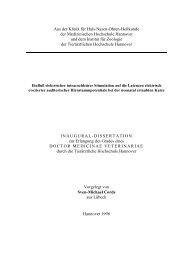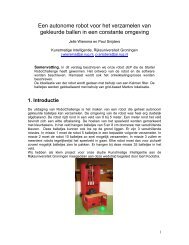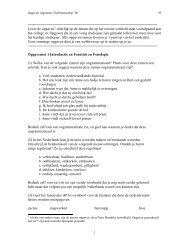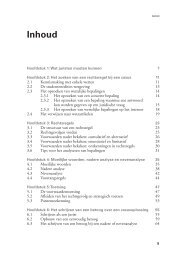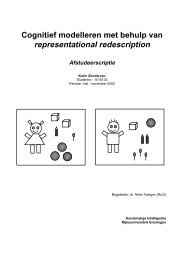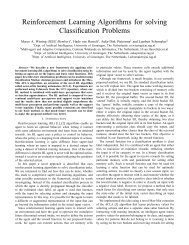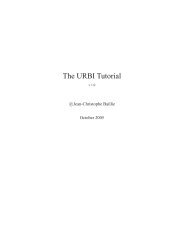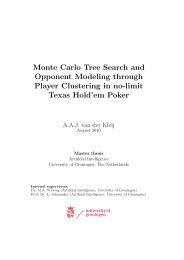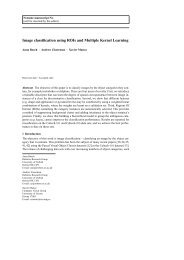Presuppositions in Spoken Discourse
Presuppositions in Spoken Discourse
Presuppositions in Spoken Discourse
Create successful ePaper yourself
Turn your PDF publications into a flip-book with our unique Google optimized e-Paper software.
Anaphors and Bound <strong>Presuppositions</strong><br />
Speaker B [m]#|<br />
Speaker a probably wouldn‘t get anyth<strong>in</strong>g and B, it would be a long time before<br />
you knew that you anyth<strong>in</strong>g~|<br />
The presupposed material and its potential antecedent are not surface-identical but<br />
the <strong>in</strong>formation that you weren’t gett<strong>in</strong>g anyth<strong>in</strong>g <strong>in</strong> the scope of the modal verb would<br />
and probably will be able to easily serve as an antecedent to the <strong>in</strong>duced<br />
presupposition you weren’t gett<strong>in</strong>g anyth<strong>in</strong>g which is also <strong>in</strong> the scope of the second<br />
would. The <strong>in</strong>duced presupposition <strong>in</strong> the second modal context needs to be bound<br />
to material found <strong>in</strong> the first modal context, 11 i.e. this is an example of the<br />
phenomena of modal subord<strong>in</strong>ation discussed <strong>in</strong> Roberts (1989). Modal<br />
subord<strong>in</strong>ation is found with pronom<strong>in</strong>al anaphor as well as with presuppositional<br />
expressions, and it is <strong>in</strong> <strong>in</strong>terest<strong>in</strong>g to f<strong>in</strong>d a naturally occurr<strong>in</strong>g example with a<br />
factive. Geurts (1999) gives a uniform analysis of examples of pronom<strong>in</strong>al and<br />
presuppositional modal subord<strong>in</strong>ation <strong>in</strong> an extension of the b<strong>in</strong>d<strong>in</strong>g theory. His<br />
analysis treats modals as presuppos<strong>in</strong>g their doma<strong>in</strong>s. This makes the second modal<br />
can be bound to the doma<strong>in</strong> of the first modal, <strong>in</strong> effect extend<strong>in</strong>g its doma<strong>in</strong>.<br />
Thus <strong>in</strong>formation <strong>in</strong> the first modal is accessible to the second and anaphoric<br />
expressions can b<strong>in</strong>d with antecedents <strong>in</strong> the first modal context. See Geurts<br />
(1999) for further explanation.<br />
What is central to notice here is that the speaker <strong>in</strong>tends for us to perceive<br />
the b<strong>in</strong>d<strong>in</strong>g relationship with the presuppositional expression <strong>in</strong> order to strengthen<br />
a feel<strong>in</strong>g of parallelism, created by the speaker repeat<strong>in</strong>g different verbs,<br />
“mightn’t/wouldn’t/weren’t” + “get/gett<strong>in</strong>g anyth<strong>in</strong>g.” The presupposition could<br />
be replaced with an abstract object pronoun, mak<strong>in</strong>g it e.g. “B, it would be a long<br />
time before you knew it,” but this would null the rhetorical effect of parallelism<br />
created by us<strong>in</strong>g the presuppositional expression.<br />
Consider now the follow<strong>in</strong>g example with an aspectual verb.<br />
(21) aspectual verb, triggered p: speaker’s sister was tell<strong>in</strong>g her off before<br />
(1-12 1108)<br />
Speaker B And, uh, so I rang up and my sister answered the phone and she -<br />
really gave *me a* terrible harangue.<br />
Speaker D ** Yeah.<br />
Speaker B Over the phone - go<strong>in</strong>g on, and on, and on, about - how could I say<br />
such th<strong>in</strong>gs {and so on}….<br />
Speaker c Trivial.<br />
11 This is actually a simplification of the analysis of the example. Compatible antecedent<br />
<strong>in</strong>formation is already <strong>in</strong>troduced <strong>in</strong> Speaker a’s first statement of “you mightn’t get anyth<strong>in</strong>g,” so<br />
it would be with<strong>in</strong> the modal context created by might that the antecedent <strong>in</strong>formation would be<br />
found.<br />
85



